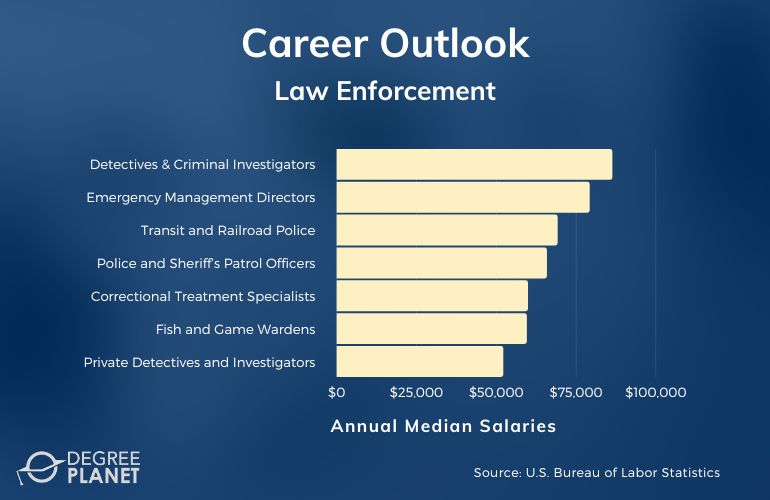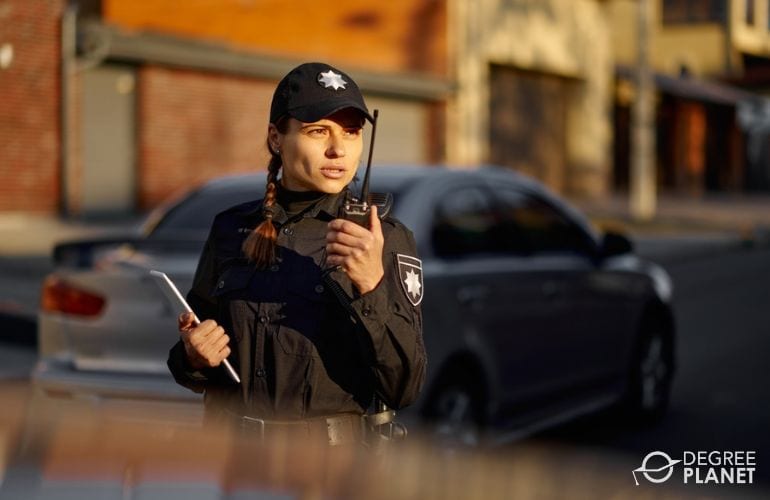Before applying for jobs with local police departments, you might consider going to college for your law enforcement degree.

By earning a bachelor’s degree in this field, you could be well prepared for the situations you might face as a police officer. Also, you may set yourself apart as a top candidate for various policing jobs.
Editorial Listing ShortCode:
If you’re interested in starting your career in the criminal justice system, you might want to take a look at online degrees in law enforcement.
Law Enforcement Degrees Online

Being a police officer takes many skills. It’s necessary to know how to work with people and navigate the criminal justice system. Also, it’s helpful to understand how to respond during crises, encourage crime prevention, and rehabilitate past criminals.
Editorial Listing ShortCode:
Some of that you could learn on the job, but a strategic option is to earn a college degree in law enforcement. In a college program, you’ll learn about evidence-based policing practices, and you might graduate knowledgeable and ready to make a difference in your community.
A degree in law enforcement might cover:
- Administrative leadership
- Community protection
- Corrections
- Court procedures
- Criminal law
- Homeland security
- Investigations
- Juvenile justice
- Trauma-informed care
Some law enforcement programs include enrollment in a police academy. You’ll combine that training with robust academics.
This approach can help shape you into a well-rounded professional who’s ready to take on the diverse challenges that modern law enforcement officers face. More commonly, law enforcement is offered as a concentration option within another college major. It fits quite well within criminal justice programs.
Whether you choose a standalone law enforcement degree or study law enforcement as part of your criminal justice program, you could graduate well equipped to handle many policing situations. Your college training might persuade hiring committees that you’d be a good addition to their police departments.
After getting hired as an officer by a local, state, or federal agency, having a bachelor’s degree could be a required stepping stone for advancement. Law enforcement leaders typically have a college education or a great deal of experience in the force.
In addition to getting you ready for a police department job, this degree could also serve as preparation for a career in corrections, security, emergency management, or private investigation.
Common Online Bachelor’s in Law Enforcement Concentrations

You might have opportunities to focus your studies on a particular area within law enforcement. Here are some common concentrations:
- Administration. This concentration will focus on the human resources and management skills that are essential for working as a leader in a law enforcement setting.
- Corrections. Since policing and corrections are closely related, it’s beneficial to study what’s involved in housing and rehabilitating offenders.
- Emergency Management. Pursuing this concentration could help prepare you to provide leadership when crises strike your community. It might also help you transition into a role as a municipal emergency management director.
- Homeland Security. You could study terrorism, border enforcement, and crisis management in a law enforcement program focused on matters of homeland security.
- Online Crime. If you’re interested in computers and technology, you might want to specialize in digital crimes and cybersecurity.
If you get the chance to add a concentration to your degree, it’s helpful to consider which option would best support your career goals.
Law Enforcement Careers and Salaries

Many people who go to law enforcement colleges intend to work as police officers of some sort. There are a wide variety of roles in policing to consider, though.
For one thing, there are local, state, and federal law enforcement agencies. Many of these agencies hire patrol officers and crime scene investigators. The roles of detective and criminal investigator often go to people with plenty of training and experience. For example, some agencies may set a bachelor’s degree as the minimum educational requirement for becoming a detective.
According to the Bureau of Labor Statistics, the median salary for occupations in protective service is $45,450.
| Careers | Annual Median Salaries |
| Detectives and Criminal Investigators | $86,280 |
| Emergency Management Directors | $79,180 |
| Transit and Railroad Police | $69,150 |
| Police and Sheriff’s Patrol Officers | $65,790 |
| Probation Officers and Correctional Treatment Specialists | $59,860 |
| Fish and Game Wardens | $59,500 |
| Private Detectives and Investigators | $52,120 |
| Correctional Officers and Jailers | $49,610 |
| Bailiffs | $49,100 |
| Security Guards | $34,750 |
Law enforcement agencies set their own hiring guidelines, and some may require career-specific training along with your bachelor’s degree. There are a variety of specialized law enforcement agencies, too. For example, studying law enforcement in college might lead to a job as a railroad or conservation police officer.
Editorial Listing ShortCode:
People with law enforcement training may work as correctional officers, bailiffs, probation officers, or parole officers. Also, law enforcement experience could be useful for a career in emergency management. Private-sector jobs include being a security guard or a private investigator.
Law Enforcement Bachelor’s Curriculum & Courses

Your classes for a law enforcement major can help you learn more about the criminal justice system. They can also prepare you with actionable skills that you may use every day when you’re on the job. Here are some course examples:
- Approaches to Criminal Corrections: You’ll learn about programs and facilities intended to punish criminal offenses and rehabilitate offenders.
- Community Patrol: This class will help equip you with practical skills for protecting a community, including its people and property.
- Criminal Investigations: You might learn how to operate at a crime scene, gather evidence, conduct interviews, and analyze lab samples.
- Criminal Law and Courts: During your time in this course, you’ll cover the key concepts in criminal law and discuss how crimes are prosecuted and tried.
- Crisis Management: You can study how to respond in critical situations and provide useful care and support for the people involved.
- Juvenile Crime and Justice: You might spend a class term learning about crimes committed by young people and the consequences they might face.
- Homeland Security: This class will focus heavily on the topic of terrorism and will also talk about protective strategies used for keeping the US safe.
- Leadership for Criminal Justice: To prepare you for future promotions, you might take a class in organizational leadership skills and learn how to apply them in law enforcement settings.
- Modern Policing Issues: In one or more classes, you may study some of law enforcement’s most pressing issues, including community violence, drug trafficking, and gangs.
- Psychology for Law Enforcement: In addition to studying general psychology, you might also spend time on the subdisciplines of abnormal psychology and forensic psychology.
You might be able to take several electives, which would allow you to specialize in an area of interest to you.
How to Choose an Online Law Enforcement Degree Program

As you look at online law enforcement studies, it’s strategic to focus on programs that will support your educational preferences and your career goals. Here are some factors to consider:
- Accreditation. If you’re taking the time to complete a degree in law enforcement, it’s beneficial to choose a school with regional accreditation.
- Format. Some colleges have standalone law enforcement programs, perhaps with a session of police academy training. Others include policing preparation within another major.
- Location. Even if you’re going to school online, you might want to consider nearby colleges. That way, the curriculum will be more likely to align with the training requirements in your area.
- Transfer credit. If you have law enforcement experience, you can check whether a school will allow you to bypass some courses. Also, many schools will allow you to transfer in an associate degree.
It’s often helpful to take a look at several programs and consider how they compare to one another.
Admissions Requirements

Colleges that offer a police officer degree may ask you to submit the following admission materials when applying:
- Essay about your interests and goals
- High school transcripts that show completion of prerequisite courses
- Reference letters from teachers or professional supervisors
- Scores from your SAT or ACT (not necessary for some colleges)
If a portion of your studies involves being enrolled in a police academy, you may be required to complete a separate admissions process for that program.
Online Law Enforcement Degrees Accreditation

If you want to launch your law enforcement career with a bachelor’s degree, then it’s strategic to study at a regionally accredited college. Regional accreditation is a widely respected form of school approval.
Editorial Listing ShortCode:
You can typically use federal financial aid at accredited schools. Also, accreditation increases the chances of being able to transfer your credits from one school to another or qualify for a graduate program, like a masters degree in law enforcement online or on campus. Some employers prefer job candidates who hold accredited bachelor’s degrees. Plus, having a four-year degree from a regionally accredited institution might someday help you start a career outside of law enforcement.
Financial Aid and Scholarships

Student aid is available for many learners who qualify. To explore the options that are available to you, you can start by filling out the Free Application for Federal Student Aid (FAFSA).
Many online students use government grants and loans. The federal government administers such programs for students around the country, and states often provide similar support for their residents. It’s possible that your college will offer you funding directly.
You might also be able to secure scholarships from national law enforcement organizations, local nonprofits, or other groups. Some employers also have tuition funds available for their workers.
Law Enforcement Professional Organizations

You may want to partner with others in your field by joining a professional organization. Belonging to one of these membership associations may equip you with new skills and ideas that you can use in your law enforcement career.
Here are some professional organizations for law enforcement workers:
- Federal Law Enforcement Officers Association (FLEOA)
- International Association of Chiefs of Police (IACP)
- National Criminal Justice Association (NCJA)
In addition to offering members benefits like journal subscriptions and online resources, these groups also conduct industry advocacy.
Is Law Enforcement a Good Career Path?

Yes, law enforcement is a good career path for many professionals. You may find it rewarding to know that you’re helping protect the people of your community.
Law enforcement offers many opportunities for advancement, especially for those with bachelors degrees. You might start off as a patrol officer and eventually make your way to working as a detective or serving in a leadership capacity.
The Bureau of Labor Statistics says that the median annual salary for detectives and criminal investigators is $86,280. Law enforcement workers who work for federal agencies have a median wage of $91,250.
What Law Enforcement Jobs Can I Get?

Degrees for law enforcement can help prepare graduates to work as police officers. Many graduates apply with local, state, or federal agencies. They may patrol neighborhoods or solve crimes. Some officers specialize in a particular type of law enforcement, such as being a transit police officer or a fish and game warden.
Another idea is to apply for a job with a correctional system. Some people with a law enforcement background work as correctional officers or parole officers, for example. Other potential careers include working as a private investigator, a security guard, or an emergency management specialist.
Do You Have to Go to College to Be a Cop?

You don’t necessarily need a college degree to start your law enforcement career. There are plenty of agencies that don’t include college studies as a requirement for employment.
A degree in this field can still be beneficial, though. For one thing, a degree may set you apart from other job applicants. Also, there are an increasing number of agencies that are requiring a college education. For example, not having a bachelor’s degree may automatically disqualify you from many federal law enforcement positions.
Editorial Listing ShortCode:
Since a college degree can lead to increased opportunities, it’s a strategic choice for many law enforcement hopefuls.
What Can You Do with a Law Enforcement Bachelor’s Degree?

It’s common for law enforcement graduates to become police officers. This degree program might include police academy training so that you can get hired as a patrol officer or a police supervisor. A bachelor’s degree is often a requirement for becoming a detective.
Other potential jobs in this field include being a security guard, a private investigator, or a parole officer. Some people use their law enforcement training to help them become emergency management directors. The Bureau of Labor Statistics says that a degree, such as a protective service bachelor’s degree, is usually needed for that job.
How Long Does It Take to Get a Bachelor’s Degree in Law Enforcement Online?

Many full-time students earn their bachelor’s degrees in 4 years. That’s especially true for those who go to campus-based or online colleges that use a traditional two-semester calendar.
Online colleges sometimes vary from that approach to the academic year. Instead, they may hold year-round terms that last just a couple of months each. Sometimes, students can move through a degree program more quickly with that style of education.
If you already have an associate degree in the field or have experience as a police officer, you may receive credit for your prior knowledge. That might shorten your schooling by a few years.
What’s the Difference Between Criminal Justice vs. Law Enforcement Majors?
While law enforcement majors do exist, criminal justice majors are more common. You may wonder whether criminal justice would fit your goals just as well as a law enforcement degree.
| Criminal Justice Major | Law Enforcement Major |
|
|
Often, law enforcement is offered as a concentration area within criminal justice programs.
Is a Bachelor Degree in Law Enforcement Worth It?

Yes, a bachelor degree in law enforcement is worth it for many students. This degree could provide an educational background that could help set you apart as a top candidate for policing jobs. It could also serve as a strong foundation for advancement.
Editorial Listing ShortCode:
The Bureau of Labor Statistics predicts approximately 421,500 job openings for the protective service sector each year over the next ten years. If you have your sights set on securing a competitive position, you might appreciate the advantage a degree can provide.
Universities Offering Online Bachelor in Law Enforcement Degree Programs
Methodology: The following school list is in alphabetical order. To be included, a college or university must be regionally accredited and offer degree programs online or in a hybrid format.

American InterContinental University offers a Bachelor of Science in Criminal Justice. Those considering careers in policing, corrections, or investigative sciences may find an excellent fit in the Law Enforcement specialization. Up to 135 qualifying credits from outside institutions may be transferred toward the program’s 180 required credits.
American InterContinental University is accredited by the Higher Learning Commission.

Baker College offers a Bachelor of Science in Criminal Justice with a concentration in Law Enforcement and Police Academy. The curriculum covers concepts like policing principles, evidence collection, cybercrime, first aid, and the psychology of crime. The program’s 120 required credit hours can typically be completed in 4 years of full-time study. All classes meet online.
Baker College is accredited by the Higher Learning Commission.

Drury University offers a Bachelor of Science in Law Enforcement. The program aims to equip students with procedural knowledge, investigative expertise, leadership skills, and communication techniques. Classes meet using a blend of asynchronous online and on-campus evening learning models. Potential courses include Law and Society, Victimology, The Judicial Process, and Public Information Management.
Drury University is accredited by the Higher Learning Commission.

North Carolina Central University offers a Bachelor of Science in Criminal Justice. This program is intended for students who have already completed an associate degree in the field. The program utilizes traditional on-campus and hands-on field learning formats. Many graduates pursue careers in emergency management, homeland security, law enforcement, corrections, or immigration.
North Carolina Central University is accredited by the Southern Association of Colleges and Schools Commission on Colleges.

Post University offers a Bachelor of Science in Criminal Justice. It has several specialization options: Law Enforcement, Legal Studies, Emergency Management and Homeland Security, Corrections, Crime Scene Investigation, or Correctional Counseling. The curriculum covers key topics, like forensics, investigation techniques, judicial processes, and probation. This program can be completed fully online or on campus.
Post University is accredited by the New England Commission of Higher Education.

Stevenson University offers a Bachelor of Science in Criminal Justice. This program may be an ideal next step for individuals pursuing careers in law enforcement, criminal law, corrections, or government agencies. Common courses include Constitutional Law, Research Methods in Criminal Justice, and Criminology. Classes meet entirely online and are typically 8 weeks long.
Stevenson University is accredited by the Middle States Commission on Higher Education.

Texas A&M University – Commerce offers a Bachelor of Science in Criminal Justice. The curriculum is designed to teach students how to think critically, communicate effectively, and practice evidence-based policing. This program utilizes a 100% online learning model. Upon completion of general education requirements, the major-specific coursework can typically be completed in 2 years.
Texas A&M University – Commerce is accredited by the Southern Association of Colleges and Schools Commission on Colleges.

The University of Colorado – Denver offers a Bachelor of Arts in Criminal Justice. Concentrations are available in Law Enforcement, Victims and Victim Services, and General Criminal Justice Studies. The program requires the completion of 120 credit hours. While classes are housed primarily online, at least 135 internship hours must also be completed in the field.
CU Denver is accredited by the Higher Learning Commission.

The University of West Georgia offers a fully online Bachelor of Science in Criminal Justice. Potential classes include Introduction to Law Enforcement, Constitutional Law, and Ethical Issues in Criminal Justice. The program utilizes accelerated, 8 week terms. Credits may be earned for previous experiences, such as career experiences, military experiences, special training, community work, or personal study.
The University of West Georgia is accredited by the Southern Association of Colleges and Schools Commission on Colleges.

Western Illinois University offers a Bachelor of Science in Law Enforcement and Justice Administration. Graduates of the program often pursue careers in criminal justice, public safety, emergency management, or private security. Classes may be attended online or in person at one of two campus locations. On average, the program can be completed in 4 years.
Western Illinois University is accredited by the Higher Learning Commission.
Getting Your Bachelors in Law Enforcement Degree Online

Becoming a police officer is a proud calling. In this role, you could have opportunities to serve your community and protect the people who live there.
In-depth training can help you do your best as an officer. You can get the necessary preparation by enrolling in a college degree program focused on careers in law enforcement. You also don’t have to put your dreams of becoming a police officer on hold because of a busy schedule. Flexible online classes could allow you to start right away. You can earn a quality education from an accredited online school.
You could start checking out law enforcement degrees from accredited schools today.

